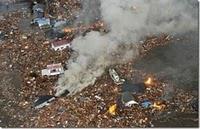
For the past 10 days, we've seen heartbreaking pictures of epic devastation in Japan, resulting from the massive earthquake and ravaging tsunami there. And read frightening reports of damaged nuclear reactors with newly elevated levels of radiation in the food and water supply. But what we've also seen are people reacting with composure and a cooperative spirit. And we've read about people demonstrating resilience and unity in the face of tremendous horror. Even with the shock of one-half million homeless and estimates of 10,000 dead, the culture of the Japanese remains one of harmony with a focus on what is best for the group. There is certainly grief and mourning the loss of loved ones, but the reaction to the tragedies has not led to a further deterioration of community cohesion.
From your distance, how do you respond? Are you overwhelmed by the 24-hour news coverage? Has your level of anxiety increased? If you're feeling vulnerable, you're not alone. The emotional reactions to disasters such as these may be even worse for baby boomers, who reveal higher levels of depression than other age groups, according to the website ThirdAge.com.
The palpable distress created by shocking news reports has added to the already high levels of stress identified by the American Psychological Association in their national survey. The study found 75% of the U.S. population experiences at least some stress every two weeks, with half of these rated at moderate or high levels, leaving people emotionally exhausted. And stress levels have increased over the past five years - even before the catastrophes in Japan - impacting both physical and psychological health.
APA has compiled some strategies to help those recovering from disasters. And to reduce your stress levels and take better care of yourself, here are some of our tips to help manage the pressures you face:
Focus on what you can control, not what you can't. The people of Japan could not stop the earthquake or tsunami but they did choose to react to the disasters with teamwork and a sense of purpose. When can't influence negative circumstances of your own, you can still decide how to handle them. Let go of painful thoughts and unrealistic expectations. Keep a journal to aid in the process of releasing frustration and coping with anxiety. Clearly define your goals and aspirations. As you keep your focus on what you can do, a positive accomplishment may emerge from the negative situation. Giving a helping hand does wonders - it provides aide to those in need and makes you feel useful too.
Maintain balance in life between family, job and your own needs. Don't over commit yourself - rather, attempt to retain a normal routine. Set aside some special time for yourself to recover your equilibrium - even if you are a sandwiched boomer with a family in flux. Get enough rest and sleep to allow your body to recover from the stresses of the day. Over 40% of the APA respondents reported lacking energy and feeling fatigued on a regular basis.
Shift your attention to what is truly important. Although hundreds of thousands in Japan lost their homes and possessions, they drew together as families and friends. As you revise your priorities, recognize the value of the underpinnings of your own strength - family, friends, spiritual connection. Express gratitude for your many gifts and change the focus from yourself to those around you. Offer help to those who require it, in Japan or in your own community. You'll feel better when you do and provide essential material support to the needy.
Draw on your strengths. APA survey respondents admitted their lack of willpower to create a healthier lifestyle, but 70% still thought they could improve and make the changes they had identified. What personal strengths have you used in the past to kick-start your progress? Rely on those now as well as ones you've developed more recently. Brainstorm ways to apply these abilities in a novel way.
The recovery in Japan will not be easy or quick. As Confucius said, A journey of 1000 miles begins with a single step. Our hearts are with the people of Japan as they continue to take small steps forward toward personal and national healing. We can all learn from their determined attitude and courageous behavior in reaction to the tremendous crises they face.
For more tips about how you can cope with your own challenges, check back here on Wednesday. And you can receive a complimentary copy of our ebook, Courage and Lessons Learned: Reaching For Your Goals when you sign up for our free monthly newsletter, Stepping Stones.

